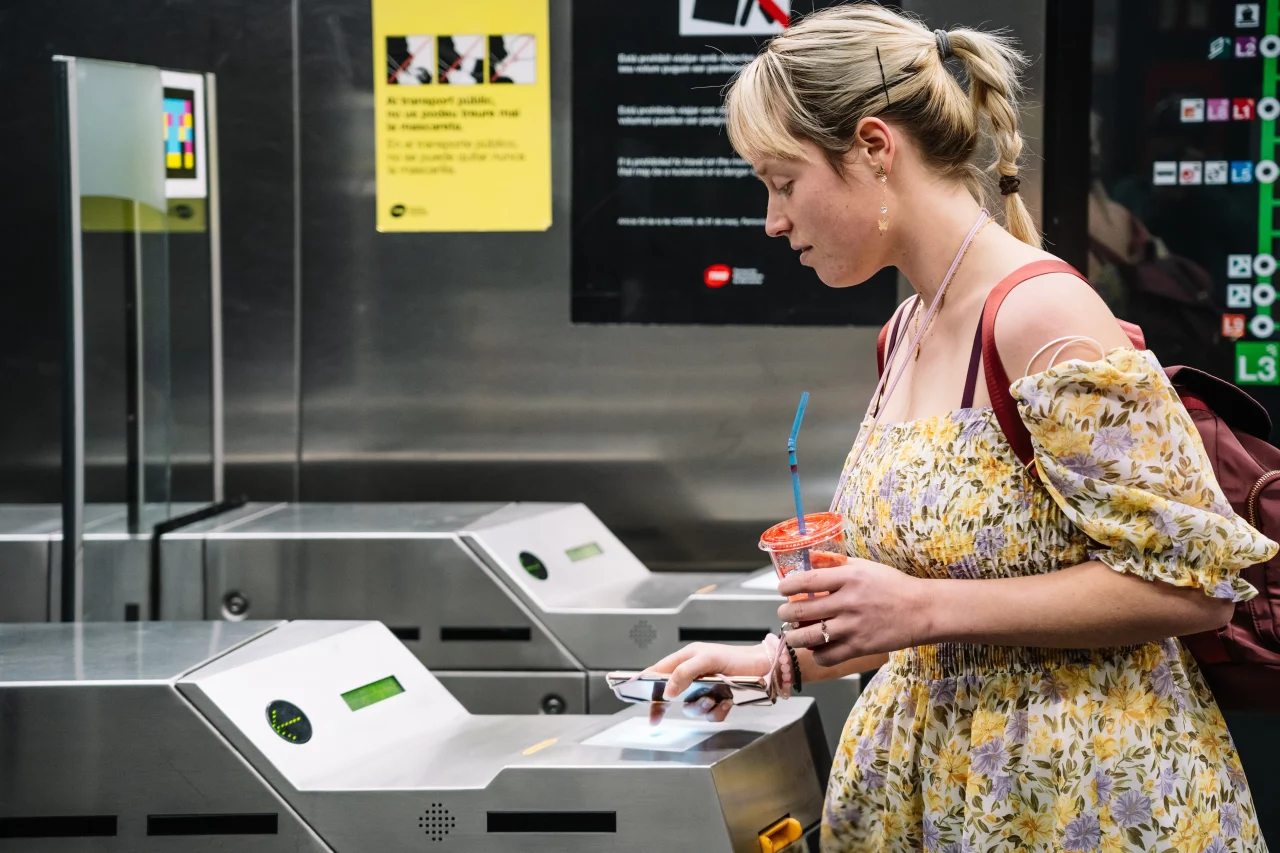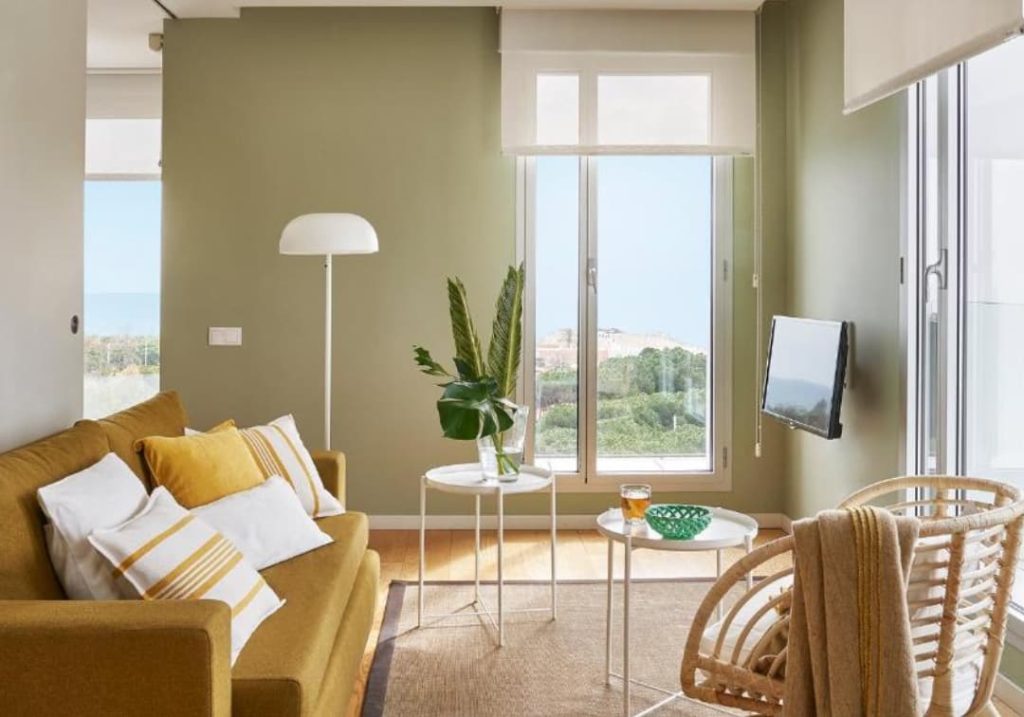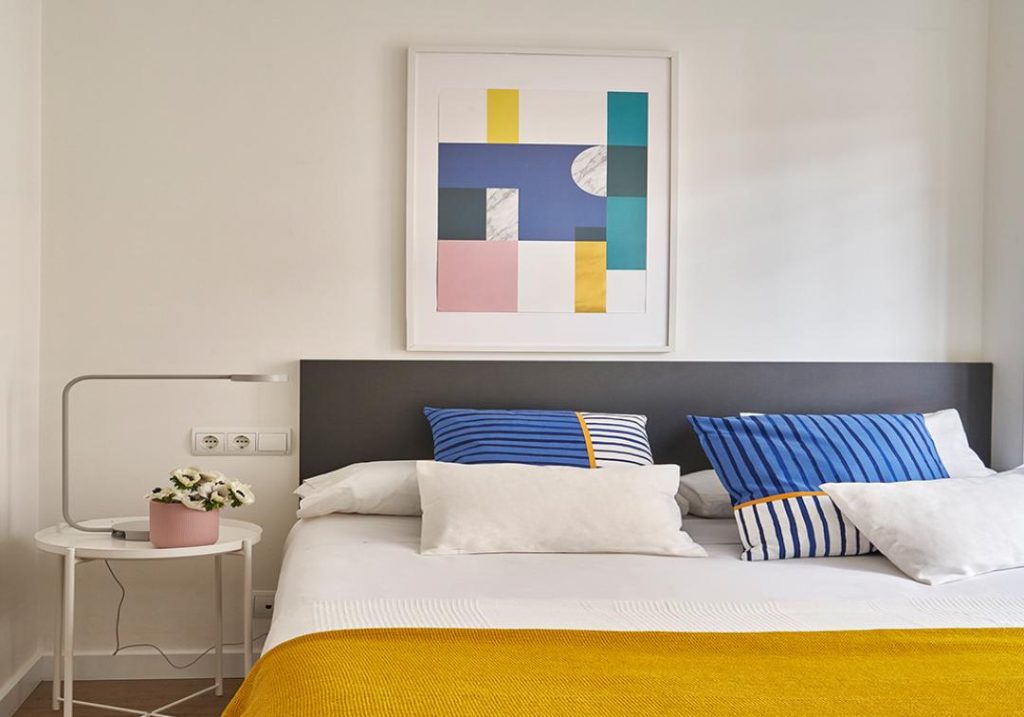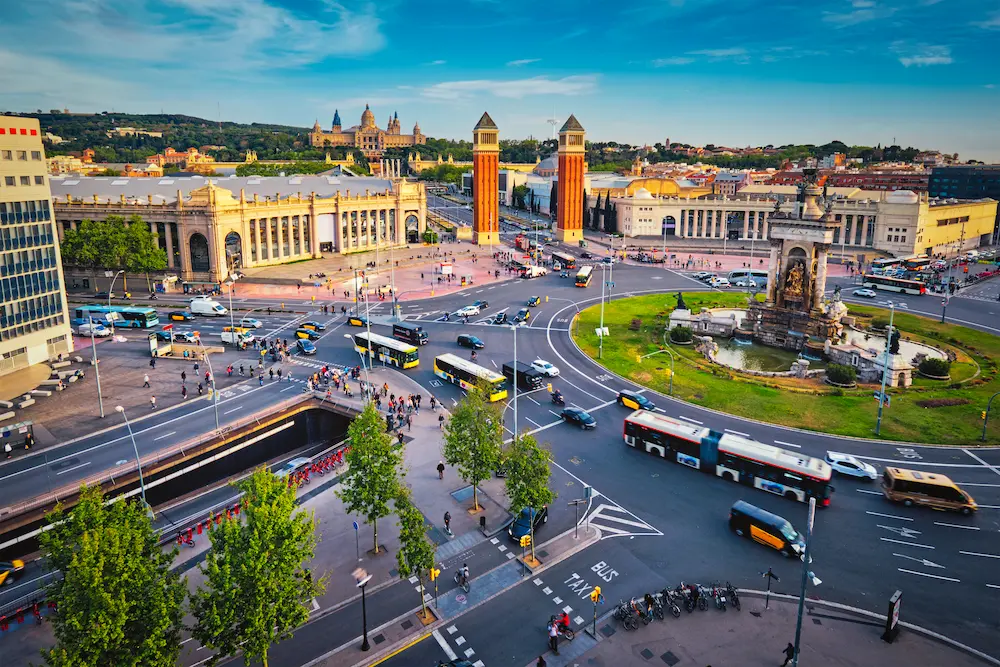- 1 Coworking spaces: Offices and cafés with a work-friendly atmosphere
- 2 Cost of living and budget: Tips for managing your money in the city
- 3 Transport network – move around the city and its surroundings with ease
- 4 Visas and permits: Necessary procedures for working as a digital nomad in Barcelona
- 5 Networks and communities: Meet other digital nomads and professionals in Barcelona
- 6 Temporary Accommodations: Rental and Lodging Options for Short and Long Stays
Are you thinking about becoming a digital nomad in Barcelona? Welcome to the perfect city for it! Barcelona has everything you need for year-round remote work: coworking spaces, a vibrant community of expats, and plenty of temporary accommodations for enjoying a season in the Catalan capital.

In this post by Lugaris, we’ll give you all the tips you need to enjoy your digital nomad life in Barcelona. Plus, on our website, we can help you find long-term apartments in the city so you can start organizing your new life 😉
Coworking spaces: Offices and cafés with a work-friendly atmosphere
Barcelona has become a top destination for digital nomads, thanks to its excellent coworking spaces and work-friendly cafés. Here’s a selection of the best spots to help you kickstart your digital nomad life in Barcelona.
- MOB (Makers of Barcelona): Located in the heart of the city, MOB offers a mix of workspaces, meeting rooms, and networking areas, making it perfect for freelancers and startups.
- Aticco Coworking: Known for its modern facilities and international vibe, Aticco has multiple locations in Barcelona, all featuring private offices, shared desks, and various networking events.
- Betahaus: A favorite among digital nomads, Betahaus includes a terrace with stunning views, providing inspiration while you work.
- Talent Garden: This space is packed with resources for digital entrepreneurs. With well-designed offices and training events, Talent Garden is ideal for those looking to grow professionally.
- Café Cometa: Located in the Sant Antoni neighborhood, this café offers a quiet atmosphere and good wifi connection, making it an ideal spot to enjoy a coffee and work comfortably.
- Federal Café: Popular for its peaceful environment and healthy menu, Federal Café features spacious areas and high-speed wifi, perfect for long workdays.
At Lugaris, we offer a great selection of beachfront apartments in Barcelona, one of the most popular areas for those looking to live and work here. Our apartments in Poblenou are especially favored due to the neighborhood’s modern vibe and numerous amenities.
Cost of living and budget: Tips for managing your money in the city
Coming to Barcelona as a digital nomad requires considering the cost of living. By planning your budget, you can make the most of your stay in the city. Here are some useful tips for managing your money in Barcelona.

Accommodation costs
- Apartment rentals in Barcelona: Rental prices can vary significantly depending on the location. In central neighborhoods like Eixample or Gràcia, a one-bedroom apartment typically costs between 900 and 1,500 euros per month. In more remote areas like Sant Andreu or Sants, you can find more affordable options ranging from 700 to 1,000 euros per month. Check out Lugaris to find the best apartment for you.
- Student residences and coliving: If you’re looking for a more economical and social option, consider student residences or coliving spaces, which generally cost between 400 and 800 euros per month.
- Room sharing: Sharing an apartment is a popular choice among digital nomads and students, as it can significantly reduce accommodation costs.
Transportation costs
- Public transport: Barcelona boasts an excellent public transport network that includes buses, the metro, and trams. A single ticket costs 2.40 euros, but you can save money by purchasing a monthly pass (T-usual) for just 40 euros.
- Bicycles: Cycling is quite popular in Barcelona. You can rent a bike through services like Bicing, which costs around 50 euros per year.
Food costs
- Supermarkets and local markets: Shopping at supermarkets like Mercadona, Lidl, or Carrefour can help you stay within your budget. Local markets such as La Boquería and Sant Antoni offer fresh products at great prices.
- Eating out: Dining in restaurants can range from budget-friendly daily menus (12 to 15 euros) to more upscale dining options. To save money, seek out restaurants that offer daily menus and affordable tapas.
Transport network – move around the city and its surroundings with ease
Barcelona has one of the most efficient and comprehensive public transport networks in Europe, making it easy to navigate the city and its surroundings. Here’s a detailed guide to help you make the most of the available transport options and get around with ease.

Barcelona Metro
The Barcelona metro is quick and efficient, featuring 12 lines that cover a large part of the city and its surroundings. It operates from 5 AM to midnight from Monday to Thursday, until 2 AM on Fridays, and runs 24 hours on Saturdays.
Useful information:
- Transport cards: Purchase cards like the T-casual (which offers 10 trips) or the T-usual (for unlimited travel over a month) to save on frequent journeys.
- Mobile apps: Use apps like the TMB App for real-time information on schedules and routes.
Barcelona Buses
The bus network complements the metro, covering areas where the metro does not reach. It operates 24 hours a day thanks to the NitBus night services.
Useful information:
- Planning: Check routes and schedules on the TMB website or through their mobile apps.
- Tickets: Bus tickets are the same as metro tickets, making transfers more convenient.
Barcelona Tram
Barcelona has two tram networks, Trambaix and Trambesòs, which connect different areas of the city and the suburbs. Trams are comfortable and accessible, making them ideal for longer surface trips.
Useful information:
- Use the same transport card: Metro and bus cards are also valid for the tram, allowing for seamless transfers.
- Check schedules: Tram schedules may vary during events, such as those held at the Forum. Be sure to check the website for the most up-to-date information.
Commuter Trains (Rodalies)
Rodalies de Catalunya connects Barcelona with its surroundings and other cities in the region, ideal for day trips to places like Montserrat, Sitges, or Girona.
Useful Information:
- Check schedules and fares: Review the Renfe Rodalies website for schedules and fares.
- Combined tickets: Consider combined tickets to save on round trips.
Bicycles in Barcelona
Barcelona is a bike-friendly city with over 200 km of bike lanes. Bicing is the public bike rental system, available for residents and visitors through subscriptions.
Practical information:
- Bicing: Subscribe to Bicing (about 50 euros per year) for access to bikes throughout the city.
- Recommended Routes: Use the Bicing app to find safe cycling routes with all the city’s bike lanes.
Barcelona Taxis
Taxis are plentiful in Barcelona and are characterized by their yellow and black color. VTC services like Uber and Cabify also operate in the city.
Practical information:
- Mobile apps: Use apps like MyTaxi (Free Now) or Cabify to request taxis and VTCs conveniently and safely.
- Fares: Check fares and possible surcharges before starting your trip.
High-Speed Trains (AVE)
Renfe’s AVE trains connect Barcelona with Madrid and other major cities in record time, offering a very comfortable and fast option for long trips.
Practical information:
- Book in advance: To get the best prices, book your AVE and intercity bus tickets in advance.
- Discounts: Look for discounts and special offers, especially if traveling in a group or as a student.
Visas and permits: Necessary procedures for working as a digital nomad in Barcelona
Working as a digital nomad in Barcelona is a great experience, but it’s important to ensure all visa and permit procedures are in order before starting. Here’s a complete guide on the visas and permits needed to work as a digital nomad in this city.

EU and EEA citizens
If you are a citizen of an EU or EEA member country, you have the right to live and work in Spain without a visa. However, there are some administrative procedures you need to complete.
If you plan to stay longer than three months, you must register at the Immigration Office and obtain a Certificate of Registration as an EU Citizen (Empadronamiento Certificate). You will need a valid passport or identity document, an application form, proof of financial means, and health insurance.
Non-EU citizens
For non-EU citizens, the process is a bit more complex and depends on the length of your stay and your work situation.
- Digital Nomad Visa: Spain has a specific visa for digital nomads, allowing remote workers to live and work in the country for up to a year, with the possibility of renewal. Check the updates on the official Spanish immigration website or consult the Spanish consulate.
- Short Stay Visa (Schengen Visa): Allows stays of up to 90 days in a 180-day period. It does not allow working but is useful for exploring the city and deciding if you want to settle long-term.
- Work Visa for Employees: If you have a job offer from a Spanish company, you will need this visa. The company must initiate the application process.
- Self-Employment Visa: If you plan to work as a freelancer, you need to demonstrate a viable business plan, sufficient financial means, and professional qualifications. This visa is more suitable for freelancers and entrepreneurs.
Additionally, health insurance is mandatory. EU citizens can use the European Health Insurance Card (EHIC) during their first months of stay. Others need to purchase private health insurance or access the Spanish public health system after registering.
Networks and communities: Meet other digital nomads and professionals in Barcelona
Meeting other digital nomads and professionals in Barcelona can offer networking opportunities and make you feel part of a community. Here are some of the best ways and places to connect with other digital nomads and professionals in the city.
- Coworking Spaces: Coworking spaces are not only places to work but also meeting points for professionals from various fields. Many of them organize events and activities to foster interaction and networking.
- Meetup.com: A platform where you can find meetups on almost any topic. Recommended groups: “Barcelona Digital Nomads,” “Tech and Startups Barcelona,” and “Barcelona Freelancers Meetup.”
- Eventbrite: A platform to discover events and activities. You can find conferences, technology workshops, and networking events.
- Barcelona Expat Life: A community of expats that organizes events and offers resources for those living in Barcelona.
- Barcelona Activa: An initiative by the Barcelona City Council to support entrepreneurs and professionals. They offer many training programs, advisory services, and networking events.
- Facebook Groups: On this social network, you will find groups like “Digital Nomads Barcelona,” “Barcelona Expats,” and “Barcelona Entrepreneurs & Startups.”
Temporary Accommodations: Rental and Lodging Options for Short and Long Stays
Knowing where to stay in Barcelona is essential for anyone looking to be a digital nomad in the Catalan capital.
At Lugaris, we offer fully equipped apartments in prime locations throughout Barcelona, including La Rambla. Our apartments are perfect for both short and long stays, situated in strategic areas like Poblenou, which is close to the beach and well connected to the city center, as well as in the heart of the city.
We provide additional services such as cleaning, high-speed wifi, and 24/7 customer support, allowing you to live without worries. Lugaris apartments are spacious, and modern, and offer excellent value for money, making them ideal for digital nomads and business travelers alike.
Visit our website now and start your new life as a digital nomad in Barcelona! 😉






